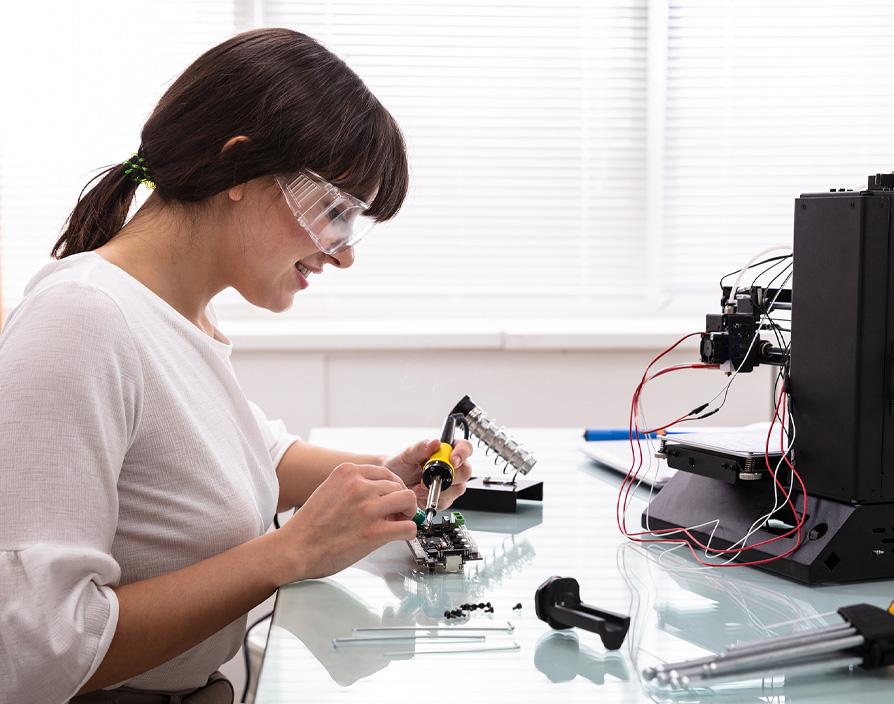But there’s a valid argument to be had about whether businesses should be playing a bigger role in inspiring talent at the grassroots level, via schools, as part of a wider move to bolster the recruitment pipeline that has, for years, stymied businesses within manufacturing, design and innovation industries.
The issue is that manufacturing continues to suffer from an image problem that prevents it from being seen as a desirable sector in which to work. Wider STEM industries are equally beleaguered by the same perception problem that wrongly consigns careers within such spheres as typically the preserve of low-skilled white old males who enjoy dirty manual labour.
Thankfully, many campaigns over the years have gone some way to recast the narrative, actively celebrating the diversity of roles, people and skill sets required to make such industries thrive. Invention and artisanal creativity, experimentation and problem-solving are increasingly being highlighted as core elements of the job, superseding the hard-hat-high-vis-jacket image for which these sectors are typically known. Prominent female scientists and engineers who are people of colour are now more commonly and rightly profiled for their professional achievements, highlighting that positive change is at last happening to old homogenous workforces.
Inspiring & diversifying innovative workforces at the grassroots
The thing is, a lot of strategies used for talent attraction and improving DE&I in industries entail reverse-engineering or bolting-on initiatives that still fall short of drawing in capable new recruits. And that’s where businesses can potentially play an impactful part in inspiring and nurturing talent from diverse walks of life to enter manufacturing, design and innovation industries, just as tomorrow’s talent starts thinking about their future – and that’s at school; more specifically, within the Design & Technology class.
Personally, I do believe that, as a discipline, Design & Technology is the great social equaliser. As a former excluded, working-class child who became a car mechanic, who became a teacher, who then became a principle and then a CEO, I say this with great conviction. I neither enjoyed school nor did I see the point of it. How – I once thought – is learning the sonnets of Shakespeare going to help with the immediate task of surviving? My parents – a cleaner and bus conductor turned publican – concurred.
My parents were born grafters, working long and hard hours in low-paid jobs, but they instilled within me a strong work ethic that put me in good stead when I entered an apprenticeship as a car mechanic straight after school. It was the first occupation I could think of that was as good as any. What I didn’t expect was for this experience to change my perceptions of careers and education completely. With an engine in front of me, all the maths and physics work that made no sense in school was suddenly evident and easy to comprehend. It was a seminal moment: the realisation that I was nowhere near as thick as school made me feel, and it drove me to pursue my first degree and eventually become a teacher. From greasy garage to evening classes; I re-entered the education system maturer, more enlightened and more engaged. Working and studying simultaneously was no mean feat, but I forged for myself a crucial second chance.
Businesses can inspire future talent
What I learnt from my own experiences as a disadvantaged pupil is that there is an engrained expectation that children, like me, will fail.It is often a self-fulfilling prophecy. This is in stark comparison to the more economically fortunate pupils who are encouraged to believe that the world is their oyster. But this perceived pointlessness of school can be tackled by marrying subjects up with industry to show how knowledge and skills can be of use in the real world. This is about positioning education in relatable terms. It can help the disenfranchised understand what is possible, ignite interest and stir up a previously unknown passion. This can be in the form of educational institutions partnering with businesses, from tech start-ups to product design firms, to contextualise the curriculum so that students can actually find purpose in what they’re learning. For example, many children and indeed parents can’t visualise what kind of professions can come off the back of studying art and design when the discipline underpins everything – from product invention to developing brand identities for chocolate.
A wider strategy for safeguarding UK’s leadership in innovation
Whilst my apprenticeship gave me context and purpose, it provided me with a vital alternative gateway to the academic and professional world. I’m sure I would have had an epiphany moment much sooner had it been a subject I studied at school. It might have even compelled me to engage more in learning. It’s why I ultimately transitioned from teaching to heading up the Design & Technology Association, an organisation that continues to lobby for educational reform of Design & Technology – a curricular subject that I, from first-hand experience, believe democratises the acquisition and nurturing of essential skillsets necessary for today and critical to our future.
Design & Technology, however, is in a state of national neglect. Yet it’s vital we support a discipline that brings in an estimated £97.4bn to the UK economy (Design Council, 2022). It’s the reason why, this year, I’ve been working in close consultation with hundreds of teachers nationwide, with industries and influencers like Sir Jony Ive KBE, Will Butler-Adams OBE and engineer Yewande Akinola MBE, to support a new vision for the future of Design & Technology. Intentions must be ratified through effective policies to help the UK raise the next generation of innovators, inventors and problem solvers right from the grassroots and make this pathway genuinely accessible to all.
Businesses like FemTech brand Elvie, nursery and manufacturer brand Mama & Papas, heritage racing car toy maker Scalextric, and meal kit retailer Mindful Chef – among many others – have collaborated to breathe new life into the curricular subject. Collectively, they have come together as part of the Inspired By Industry initiative to develop engaging school resources and invite pupils to respond practically to real-life design briefs. Design & Technology is not a so-called ‘Hobby’ subject that produces superficial and frivolous outcomes. We increasingly look towards it for solutions when addressing some of the biggest humanitarian threats of our time – climate change, pandemics, an ageing society – to name just a few.
It’s patently apparent that we need to start investing in grassroots talent in a different way, and businesses are fast becoming a conduit for this much-needed change. The old way, after all, isn’t working. It all starts by changing the root problem: the negative mindset that perpetuates chronic underachievement and replacing it with aspiration and purpose. Businesses are starting to play an incredibly powerful part in nurturing young talent to secure the UK’s leadership in design, innovation and manufacturing disciplines. It’s high time we started tackling our continued industry recruitment and talent pipeline from the bottom up.
Share via:









































